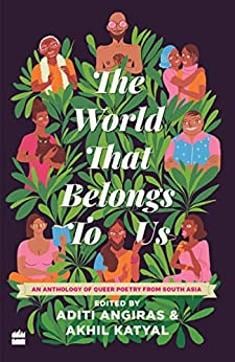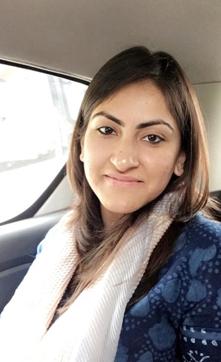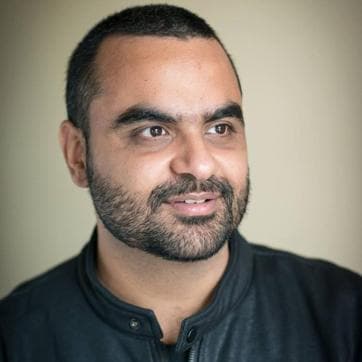Review: The World That Belongs To Us: An Anthology of Queer Poetry from South Asia edited by Aditi Angiras and Akhil Katyal
An ambitious undertaking, this anthology ensures that trans, non-binary, Dalit and Muslim voices, which are often marginalized in mainstream queer spaces, get to have their say

What must a poem do to make itself worthy of a place in a queer anthology? Should it be dressed in rainbow colours, soothe a broken heart, or scream resistance from the rooftops? Can it be quiet or does it have to speak to the other poems in the collection? Would it qualify as a queer poem only if the poet is out and proud? Does a poem become queer only in the act of reading?
These questions came rushing forth as I read The World That Belongs To Us: An Anthology of Queer Poetry from South Asia. Edited by Aditi Angiras and Akhil Katyal, this is an ambitious undertaking, and a delightful confluence of poetic voices across geographies, languages and identities -- Gee Semmalar, Kazim Ali, Leah Piepzna-Samarasinha, Vikram Seth, Ruth Vanita, Chanchal Kumar, Phurbu Tashi, Hoshang Merchant, Santa Khurai, Vqueeram Aditya Sahai, Ramchandra Srinivas Siras, Zulfikar Ali Bhutto and more. This is a remarkable feat.
In 2018, when Angiras was interviewed by poet Chandramohan S for a literary blog called Cafe Dissensus Everyday, she had said, “Many a times anthologies, actually most times, are like birthday parties. You send out an invitation to those you know and those you think you wanna hang out with. It becomes a bubble; the possibility of striking conversations with strangers gets rare.”
This realization made the editors walk down a different path when they began to assemble their own book. They issued an open call for submissions, which took a life of its own in online queer communities. Apart from circulating it far and wide, people wrote back to the editors with suggestions that challenged, expanded and deepened their understanding of what it means to be queer. The experience of queerness is shaped by race, ethnicity, religion, caste and the nation-state. It is not merely about having a non-normative sexual orientation or gender identity.

In the poem Queer As In, Riddhi Dastidar writes, “Tomorrow I’ll come with you to Dokkhinneshwar, Ma,/ but it’s going to take more than flowers-prayers-proshaad because/ I am never going to be any less abnormal, Ma,/ sorry I couldn’t be more normal, Ma.” In What Does It Take to Belong? Raqeeb Raza writes, “My ‘Mallu’ friend, I’ve been told,/ is now a Pakistani too,/ as are all the cow eaters,/ or even those, who do not pray/ to the ‘Gau Mata’, they say,/ are now Pakistani.” These poets compel the reader to think about queer identity in the context of religious beliefs and traditions instead of believing that everything is hunky dory after Section 377 of the Indian Penal Code was read down by the Supreme Court.
An anthology that brings together desi and diasporic poets from Chennai, Lahore, Varanasi, Kolkata, Kathmandu, Dhaka, Colombo, Karachi, Vancouver, Dublin and various other places is certainly something to celebrate at a time when jingoistic sentiments are making cross-border dialogue in South Asia almost impossible. Many of the poems featured in this collection were originally written in Bangla, Urdu, Gujarati, Hindi, Kannada, Punjabi, Malayalam, Marathi and Nepali and later translated into English. It also benefits from the labour of an impressive set of translators including Mamta Sagar, Maaz Bin Bilal, Somrita Urni Ganguly, Dhiren Borisa, NP Ashley, Rohan Chhetri, Jasdeep Singh, Anish Gawande and others.
In their preface, Angiras and Katyal write, “...this thing many of us know as ‘queer’ was only an odd, lovely but tentative bridge between us and for all the entries that would come to us in the coming months. People live their lives through a maddeningly complex slew of names, identities and gestures. ‘Queer’ only pretends to signpost them all, but it is precisely that, a convenient pretence, meant for book covers, not for all its contents.”

In the poem Body/ Lost in Translation, Fatema Bhaiji writes, “Body, I am trying to come home to you/ but you are a country my passport does not recognize.” In This World Isn’t for You, Phurbu Tashi writes, “Why would I embrace desires that make life harder for me?” In the poem Love in the Time of Dysphoria, Minahil Abideen writes, “A need to be hugged. It must count/ as the simplest of needs, to be comforted, and told – and each of us/ must be told – that everything would be fine.” In Old Men, R Raj Rao writes, “He prefers old men/ To Hrithiks and Salman Khans./ Old men have breasts.”
Each poem has its own flavour, emotion and smell. I remember fondly the two that made me laugh. Shakti Milan Sharma’s Hinglish poem Laga Jockey Mein Daag is a raunchy response to the hit Hindi film song Laaga Chunari Mein Daag written by Sahir Ludhianvi and sung by Manna Dey. Hadi Hussain’s poem Fat Talk makes a jibe at “the NGO which instantly starts shitting/ rainbows, every time there is someone significant/ from the western neo-liberal funding machine around,/ shows them through graphs and numbers,/ how many condoms and lubes, they have distributed/ among the ‘community members’ so/ they can fuck safely.”
A lot of effort seems to have gone into the curatorial process. While Angiras and Katyal might receive criticism for focusing mostly on Indian and Pakistani poets, and hardly giving a platform to poets from Nepal, Bhutan, Bangladesh, Sri Lanka, Afghanistan and the Maldives, let us applaud what they have accomplished. They have created a home for diverse forms including ghazals, sonnets, free verse, prose poems, list poems and multilingual poems. They have also ensured that trans, non-binary, Dalit and Muslim voices, which are often marginalized in mainstream queer spaces, get to have their say loud and clear.
In the preface, the editors state, “...we know ‘taste’ (or its close friend ‘merit’) in South Asia is a loaded thing. It replicates social hierarchy. It unhears caste. And class. It pretends cultural capital does not exist. It ignores linguistic diversity and odd hierarchies which creep in between languages. It is not able to digest that each poem has an echo and a vagitus, each of it is a conversation, a meditation, a quarrel. Which different readers are poised to hear differently.”
Chintan Girish Modi is a writer, educator and researcher. He is @chintan_connect on Twitter.



